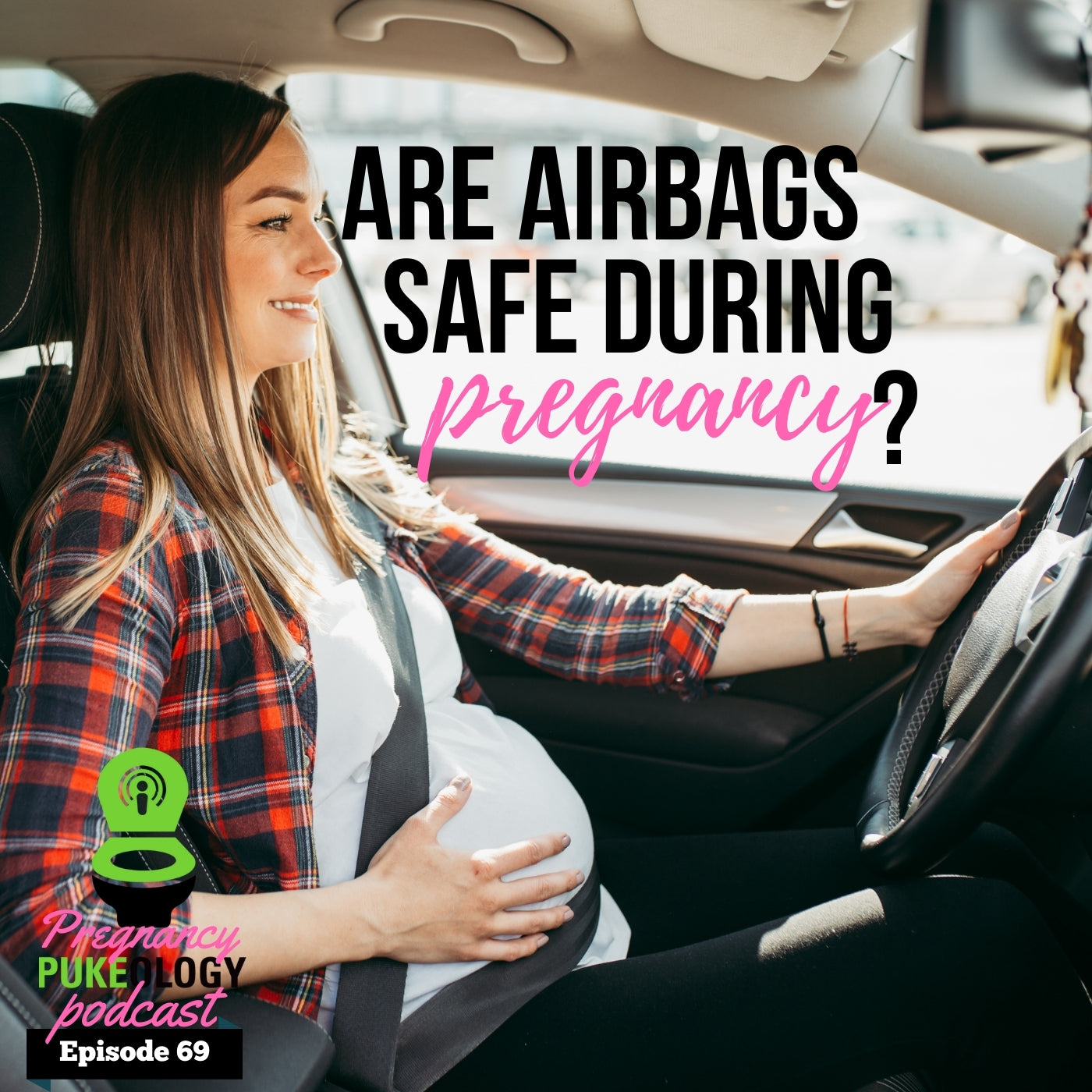
Are Airbags Safe During Pregnancy?
Have you ever driven in the car in your third trimester and wonder are airbags and seat belts safe for me and baby? 200,000 car crashes involve pregnant women leading to 400 fetal deaths so I need to tell you how to adjust your seat belt if your pregnant right now in today’s Pregnancy Pukeology Podcast Episode 69: Are Airbags Safe During Pregnancy?

Are Seat Belts and Airbags safe During Pregnancy?
Airbags and seat belts can help reduce the risk of death and sustain a serious injury when one gets involved in an accident. 200,000 car crashes involve pregnant women so you might have a few questions before you put on your seat belt. However, should pregnant women deactivate the airbag? Should they avoid wearing a seatbelt while traveling? Read on to learn more about the use of airbags and seat belts while pregnant.
Are Airbags Safe During Pregnancy?
Yes. Airbags are safe during pregnancy, and doctors recommend that you don’t turn off the airbag disabling switch. Current studies show that airbag does not increase the risk of pregnancy complications in women involved in traffic accidents.
According to a 2002-2005 study conducted in Washington State that involved 3,348 collisions, there is no evidence of increased risk of pregnancy complications such as abruption placenta (detachment of the placenta from the fundus of the uterus), c- section, and fetal distress in women whose airbags deployed at the time of the accident.
However, the study showed that fetal demise was more (1%) in women whose crashes involved the airbag deployment than those without an airbag. However, this figure was insignificant, and a clear conclusion cannot be made.
American College of Obstetricians and Gynecologists (ACOG) recommends that women have their vehicle airbags not disabled because they essential in saving lives when one gets involved in a traffic accident.
Should Pregnant Women Wear a Seatbelt?
Being pregnant should not make you avoid wearing a seatbelt. On the contrary, whether in the first trimester or third trimester, wearing a seatbelt is recommended to protect yourself and your unborn baby.
Studies show that about 80% of fetal deaths due to road traffic accidents would not have occurred if their mothers had buckled their seatbelt. Further studies show that wearing a seatbelt does not increase the risk of harm to your unborn child.
Besides, if you don’t sustain an injury during a traffic accident, there are higher chances that your unborn child would not be harmed. But, there are possibilities that your baby is harmed if you get injured during an accident. Therefore, buckling your seatbelt help protect you and reduce the risk of harm to your baby.
How Should You Wear Your Seatbelt During Pregnancy?
You should make a slight adjustment wearing a seatbelt while pregnant. You should make sure that the shoulder belt passes on your shoulder – away from your neck – and across your chest between your breasts. Also, always avoid placing the seat belt below your armpits or through your back.
If you are wearing a lap belt, be sure it is secured below your tummy to not compress your belly in case a crash occurs. Also, ensure that the lap belt fits snuggly.

How You Should Adjust Your Seat
You should adjust your seat to the position that provides comfort throughout your journey. For instance, your seat should be upright, allowing you to maintain a reasonable distance between your tummy and the steering wheel or dashboard.
Stop Car Sickness in Pregnancy
If you already suffer with motion sickness it is no surprise to you that you have to be in the front of the car, can’t read a book or play video games while the car is moving, but did you know pregnancy makes you more sensitive to car sickness. Women who suffer with morning sickness (usually 80% of all pregnant women) generally have acute car sickness and vertigo like symptoms when riding in the car. Nausea from the smell of gasoline has also been reported.
Get rid of car sickness in seconds using a 3:1 technique. Apply acupressure at the P6 point on the wrist using NoMo Nausea Band which also has peppermint essential oil infused for immediate relief when smelled. You can make this band at home but when the price point is under $15 why would you? Just pick one up from amazon or www.NoMoNausea.com and your car detail bill will never be the same without NoMo Bands.
Bottom Line
Airbags and seat belts are your most effective tools to protect yourself and your unborn baby during a traffic accident. Ensure your airbag switch is not turned off throughout the journey.
During pregnancy, ensure your appropriately wear your seat belt as discussed above. In case you get involved in a traffic accident, always remember to call your doctor to assess you and ensure that you and your unborn baby are healthy.
